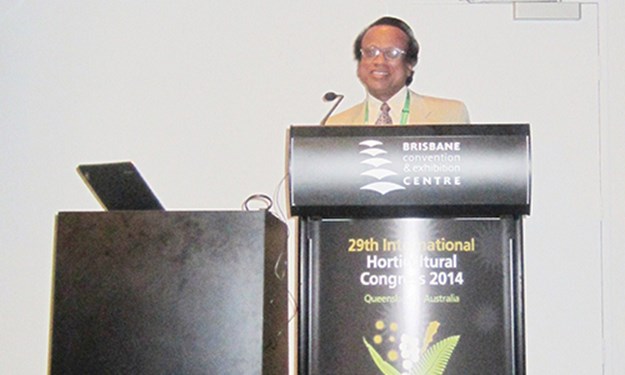Alcorn’s Panicker delivers lecture in Australia
Invited by the International Society for Horticultural Science (ISHS), Belgium, Dr. Girish K.S. Panicker, associate professor and director of the Center for Conservation Research, School of Agriculture, Research, Extension and Applied Sciences (AREAS), delivered a lecture entitled, “Transition from conventional to long-term organic management practices: Impact on soil properties and biomass development in muscadine vineyard” at the Society’s 29th International Horticultural Congress held recently in Brisbane, Australia.
ISHS is the largest horticultural society in the world with members in 156 countries, and its congress was attended by over 4,000 people from around the globe. This international congress is held every four years in different countries and this is the third time that Panicker was invited by the society to deliver his lecture on conservation research on horticultural crops. He delivered his first lecture on C-factor research on horticultural crops in 2002 Toronto, Canada, and his second lecture — on conservation research on organic blueberries in 2006 in Seoul, South Korea.
“Organic food production is the fastest growing sector in the field of agriculture. Organic food sales in the U.S. have more than quintupled since the late 1990s from 3.6 billion to 21.1 billion in 2008. Developing strategies for lowering the risk of yield loss during the required 3-year transition period from conventional to a certified organic destination is the subject of a number of organic research programs in the world,” said Panicker.
“An important issue is the economic loss from freeze damage to America’s fruit industry that exceeds the loss from insect, disease, rodents, and weeds combined. Blueberry farmers experience major crop losses due to late freezes that occur in the spring,” Panicker said.
Panicker’s presented materials will be published in the peer reviewed proceedings of the society, which will be circulated in major libraries of the 156 member countries.




